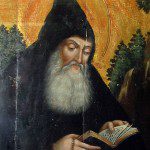![By Ted (Flickr: Icon: St. Cyril of Alexandria) [CC BY-SA 2.0 (http://creativecommons.org/licenses/by-sa/2.0)], via Wikimedia Commons](https://wp-media.patheos.com/blogs/sites/637/2017/01/Icon_St._Cyril_of_Alexandria-225x300.jpg)
But some of those listening might well say: What would you say if someone were to come forward and out of curiosity ask: Has poverty crowned itself with the prestige of piety toward God, and has it become honored by the law of justice, while the state of wealth is accursed, and has received a cruel sentence against it? How can this be? One must, however, consider the following: wealth in this life is always somehow associated and linked with many harmful things, at least for the most part. The wealthy are more prone to arrogance, uncontrolled in greed, and dominated by pleasures as much as by luxury. But those worn down from poverty can hardly suffer from such things. They constantly grieve that they have nothing, and bewail and groan over themselves. They are as far removed from pleasure as from luxury. Their whole concern is to gather the little that they may, and to find some modest compensation in the face of necessity. [2]
Avarice is, as Paul and St. Cyril of Alexandria noted, a form of idolatry, and the poor are sacrificed so that the rich can get richer. Those who fall for this idol do not know God, for God is a God of love, a God who promotes not destroys the weak and the poor, as St Cyril of Alexandria explained:
Paul also refers to avarice as idolatry, and rightly so; it is a godless vice, and people who trample on love for their brethren, which is the fulfillment of the Law, are on par with those who do not know the one who is God by nature. [3]
If Israel was condemned for its social injustice, what are we to expect will happen when the United States follows suit? Should it not be similar to what the prophet Jeremiah indicated would happen to Israel?
For wicked men are found among my people; they lurk like fowlers lying in wait. They set a trap; they catch men. Like a basket full of birds, their houses are full of treachery; therefore they have become great and rich, they have grown fat and sleek. They know no bounds in deeds of wickedness; they judge not with justice the cause of the fatherless, to make it prosper, and they do not defend the rights of the needy. Shall I not punish them for these things? says the LORD, and shall I not avenge myself on a nation such as this? (Jer. 5:26-29 RSV).
Jeremiah could easily have been preaching against the state of affairs seen in the United States today. The traps have been set, the poor and oppressed, in their ignorance, fell for the siren-call of Trump’s social media, allowing them to put into power the one who will do all that he can for his elite friends to grow fat on their labor.
Trump’s haughty attitude, calling those who do not meet him in his elite group as losers, demonstrates he does not know true success, and so his goal in life is shallow and will lead him nowhere in eternity. True riches are not with money but in deeds:
As for the rich in this world, charge them not to be haughty, nor to set their hopes on uncertain riches but on God who richly furnishes us with everything to enjoy. They are to do good, to be rich in good deeds, liberal and generous, thus laying up for themselves a good foundation for the future, so that they may take hold of the life which is life indeed (1 Tim. 6:17-19 RSV).
Indeed, Jesus could have been speaking directly to Trump and his supporters in the Apocalypse when he said, “For you say, I am rich, I have prospered, and I need nothing; not knowing that you are wretched, pitiable, poor, blind, and naked” (Rev. 3:17 RSV).
We must pity Trump and pray for him, hoping for metanoia and he does what is right when in power, but more importantly, we must work against any agenda which continues to stand in the way of justice. We must stand together, working for the benefit of the unjustly oppressed at the hands of the government, remembering that the rich have already received their consolation in their wealth: “But woe to you that are rich, for you have received your consolation” (Lk. 6:24 RSV).
Our tactics have to be just but also wise. If the rich pity not the poor and the oppressed, there is little reasoning possible with them, as Sirach warns us: “Do not quarrel with a rich man, lest his resources outweigh yours; for gold has ruined many, and has perverted the minds of kings” (Sir. 8:2 RSV). Their idolatry has made them incapable of seeing reason; so long as they feel satisfied in their life, they see no reason to be concerned about the plight of others, which is why they make all kinds of excuses to ignore what justice dictates. The only solution is for the many exploited to come together, to no longer merely accept what they are told by their exploiters. As long as they keep justice mixed with charity, justice will be on their side, the rich will find their way of life will come crashing down and to an end, as St. Cyril of Alexandria also explained:
Accordingly, it is possible to see from this that the desires of the lovers of luxury will come to a bitter end, in keeping with the Savior’s statement, “Blessed are those who mourn, for they will be comforted.” In other words, while luxurious living will finish in tears, the end of hardship is respite, as is confirmed by someone’s statement, “The fruit of good labors is renowned.”[4]
There is hope to be had for the poor, knowing that they will be comforted and blessed with great rewards, while their exploiters will have to pay back all they have stolen from the hands of the poor. The rich, so long as they do not understand the purpose of wealth is to be shared and used to help create a just state for all and not a luxurious life for the elite, will find themselves fearing the judgment which they have brought upon themselves, as once again, demonstrated in the writings of St Cyril:
They slapped the faces of the poor (v.7). He clearly censures and blames them for oppression and injustice, being ungodly and uncaring; those to whom they should have given care and respect and been prepared to apply loving assistance they normally by contrast treated unjustly, abusing them with intolerably harsh indignities, despite their being burdened with poverty. Our Lord Jesus Christ, on the other hand, takes what is done to them as directed at his own person, saying, “Whatever you did to the least of these, you did to me.” We therefore seriously offend God in oppressing the weak and “striking the lowly with our fists,” as Scripture says, aggravating the condition of those caught up in poverty by our hostility when we are obliged instead to extend to them brotherly love.[5]
All those who look away at the injustices being waged against the poor and the weak in society are looking away from the injustices which were rendered to Christ. If what is done to the least of these is what is done to Christ, what Christian who loves Christ can stand back and say nothing as Christ is once again slapped in the face by the newest trumped-up upstart planning to rule the nation for his own gain?
[1] Fairer treatment, not fair treatment, because the regulations as of yet do not stop the unjust exploitation of the poor; right now they only lessen the kind of exploitation and gives the poor a little defense from outrageous abuse, a defense which it appears Trump and his cabinet pick want to eliminate.
[2] St. Cyril of Alexandria, Festal Letter 11 in Festal Letters 1-12. trans. Philip R. Amidon, SJ (Washington, DC: Catholic University of America Press, 2009). 205.
[3] St. Cyril of Alexandria, “Commentary on Amos” in St. Cyril of Alexandria: Commentary on the Twelve Prophets. Volume 2. trans. Robert C. Hill (Washington, DC: Catholic University of America Press, 2008), 72.
[4] Ibid., 56.
[5] Ibid., 31.
Stay in touch! Like A Little Bit of Nothing on Facebook:
A Little Bit of Nothing













